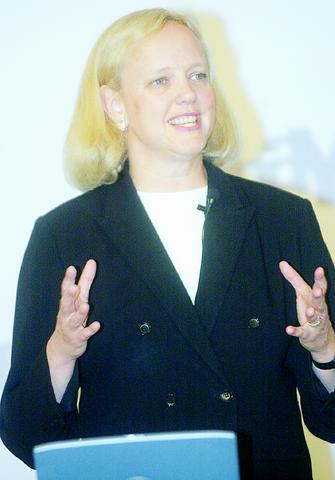The head of eBay Inc was in town yesterday to further stress her company's commitment to the Taiwan market, saying although Yahoo-Kimo is its rival, the two companies may have the chance to cooperate in the future.
"Right now in Taiwan eBay and Yahoo are competitors because both of us are trying to build marketplaces?[but] we would like to have a dialog with Yahoo-Kimo in the future," said Meg Whitman, CEO of eBay.
Whitman said eBay's relationship with Yahoo varies by countries and by regions. In Europe, for instance, the two are partners where in May eBay started offering auction services for Yahoo. In the US, eBay is so large that Yahoo chooses not to emphasize its auction business there.

PHOTO: HUANG REI-PO, TAIPEI TIMES
"However [in Taiwan] in any respect both of these two companies are expanding their e-commerce business and so it's actually a good thing to have two players because we are growing the market together," Whitman said.
In a recent interview with the Taipei Times, Yahoo-Kimo's general manager Rose Tsou (鄒開蓮) said their strategy was to topple eBay.
"There are not many online auction companies in Taiwan, and we are very confident the edge between us and eBay Taiwan is miles apart," Tsou said. "We absolutely want to be in Yahoo Japan's position: successfully defeating eBay Japan and become the market winner."
In an effort to boost traffic, eBay Taiwan has cooperated with major Internet portals -- PC Home online (網路家庭), Yam.com (蕃薯藤), MSN, Sina (新浪網) and Hinet, except of Yahoo-Kimo.
Whitman had her first visit to Taiwan yesterday after finishing trips in Shanghai and Seoul early this week.
eBay entered Taiwan in late February by fully purchasing local e-commerce venture NeoCom Technology Co (力傳資訊), along with its two shopping Web sites -- ubid.com.tw (買賣王) and bid.com.tw (拍賣王) -- for over US$9.5 million.
Even users of eBay in western countries have to pay for membership before selling stuff online, currently eBay doesn't charge Taiwanese users and all of the company's revenue come from advertising.
According to Whitman, pay-service is eBay's essential business model but it won't charge Taiwanese users until the market is ready.
"It depends on how the market develops?currently the most important thing is to build a vibrant marketplace which sellers and buyers are satisfied with," she said, adding that "it's impossible to tell right now when [we will charge] in Taiwan."
This is Whitman's first visit to Taiwan after going to Shanghai and Seoul early this week.
In late March eBay invested US$ 30 million to buy a 33-percent stake in Chinese auction site EachNet, the biggest online trading community in China with 3.5 million registered users.
A year ago, eBay acquired a 51 percent stake in South Korea's largest online auction business, Internet Auction Co, for about US$120 million.

When Lika Megreladze was a child, life in her native western Georgian region of Guria revolved around tea. Her mother worked for decades as a scientist at the Soviet Union’s Institute of Tea and Subtropical Crops in the village of Anaseuli, Georgia, perfecting cultivation methods for a Georgian tea industry that supplied the bulk of the vast communist state’s brews. “When I was a child, this was only my mum’s workplace. Only later I realized that it was something big,” she said. Now, the institute lies abandoned. Yellowed papers are strewn around its decaying corridors, and a statue of Soviet founder Vladimir Lenin

UNIFYING OPPOSITION: Numerous companies have registered complaints over the potential levies, bringing together rival automakers in voicing their reservations US President Donald Trump is readying plans for industry-specific tariffs to kick in alongside his country-by-country duties in two weeks, ramping up his push to reshape the US’ standing in the global trading system by penalizing purchases from abroad. Administration officials could release details of Trump’s planned 50 percent duty on copper in the days before they are set to take effect on Friday next week, a person familiar with the matter said. That is the same date Trump’s “reciprocal” levies on products from more than 100 nations are slated to begin. Trump on Tuesday said that he is likely to impose tariffs

HELPING HAND: Approving the sale of H20s could give China the edge it needs to capture market share and become the global standard, a US representative said The US President Donald Trump administration’s decision allowing Nvidia Corp to resume shipments of its H20 artificial intelligence (AI) chips to China risks bolstering Beijing’s military capabilities and expanding its capacity to compete with the US, the head of the US House Select Committee on Strategic Competition Between the United States and the Chinese Communist Party said. “The H20, which is a cost-effective and powerful AI inference chip, far surpasses China’s indigenous capability and would therefore provide a substantial increase to China’s AI development,” committee chairman John Moolenaar, a Michigan Republican, said on Friday in a letter to US Secretary of

Taiwan Semiconductor Manufacturing Co’s (TSMC, 台積電) market value closed above US$1 trillion for the first time in Taipei last week, with a raised sales forecast driven by robust artificial intelligence (AI) demand. TSMC saw its Taiwanese shares climb to a record high on Friday, a near 50 percent rise from an April low. That has made it the first Asian stock worth more than US$1 trillion, since PetroChina Co (中國石油天然氣) briefly reached the milestone in 2007. As investors turned calm after their aggressive buying on Friday, amid optimism over the chipmaker’s business outlook, TSMC lost 0.43 percent to close at NT$1,150